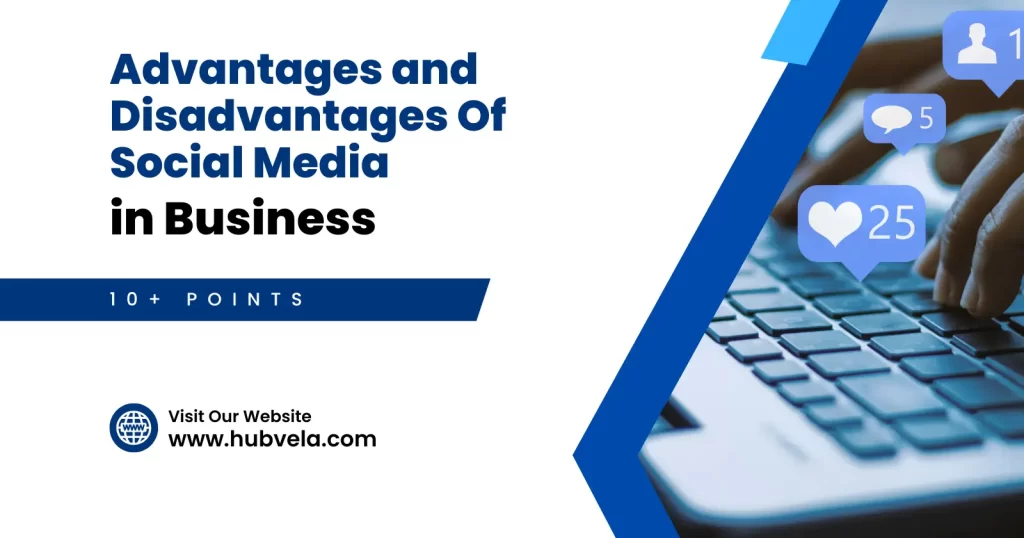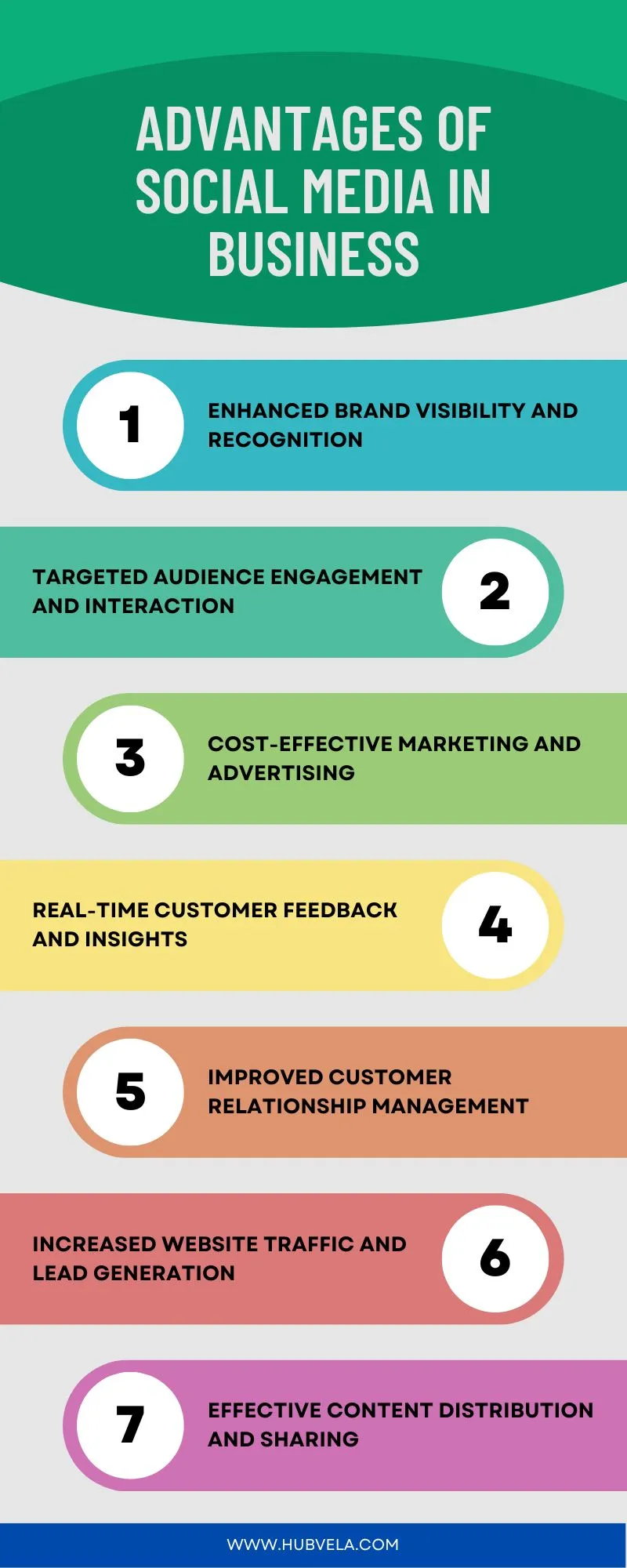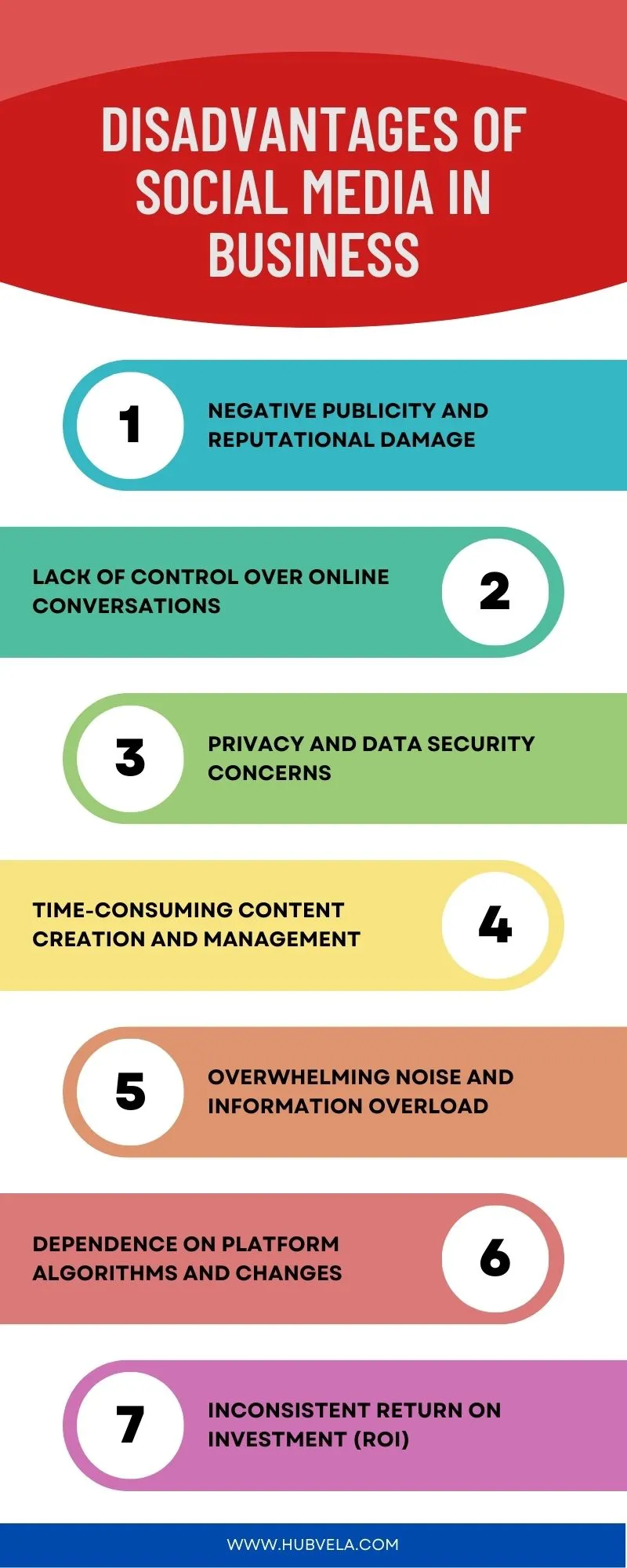Social media has become an integral part of our lives, and businesses are no exception. Social media platforms offer businesses a way to connect with their customers, promote their brands, and increase their online presence.
However, there are also some disadvantages to using social media in business. In this article, we will explore the advantages and disadvantages of social media in business and help you decide whether it is the right move for your business.

--Advertisement--
Advantages of Social Media in Business
Social media has become an integral part of how businesses market themselves, engage with their clients, and even sell to their customers. With its ease of use and wide reach, social media offers a range of benefits for businesses of all sizes.
We will explore the advantages of social media in business, including how it can help you attract customers, get customer feedback, build customer loyalty, increase your market reach, and more. We will draw insights from various sources, including.

1. Enhanced Brand Visibility and Recognition
Enhanced Brand Visibility and Recognition are crucial advantages of utilizing social media in business. By establishing a strong presence on social media platforms, businesses can reach a wider audience and increase their brand visibility.
Through regular and engaging content, businesses can effectively showcase their products or services to potential customers.
Moreover, social media allows for direct interaction with the target audience, enabling businesses to build relationships and establish brand recognition.
When customers see a brand consistently on their social media feeds, it helps to reinforce brand awareness and familiarity. This increased visibility and recognition can ultimately lead to greater brand loyalty and customer trust.
2. Targeted Audience Engagement and Interaction
Targeted Audience Engagement and Interaction is another significant advantage of social media in business. Social media platforms allow businesses to interact directly with their customers and fans, and likewise give them the chance to interact directly with the business.
This direct interaction can help businesses build relationships with their target audience, understand their needs and preferences, and tailor their content accordingly.
By using analytics tools, businesses can also gain valuable insights into their audience’s behavior and social media trends, which can inform their content strategy.
Social media is a highly cost-effective and personalized way of reaching customers while providing valuable insights into the brand.
By creating engaging and effective social media content, businesses can increase their audience engagement and interaction, which can ultimately lead to greater brand loyalty and customer trust.
3. Cost-Effective Marketing and Advertising
One of the advantages of social media in business is cost-effective marketing and advertising. Social media platforms such as Facebook, Instagram, and Twitter offer businesses the opportunity to reach a large audience at a relatively low cost.
Traditional advertising methods such as television and print ads can be expensive and may not be as effective in reaching a targeted audience.
With social media, businesses can create targeted ads that are shown to users based on their interests, demographics, and online behavior.
Additionally, social media allows businesses to engage with their audience in real time, responding to comments and messages and building relationships with customers.
This can lead to increased brand loyalty and customer retention. Social media provides businesses with a cost-effective way to market and advertise their products or services while also building relationships with their audience.
4. Real-Time Customer Feedback and Insights
Real-Time Customer Feedback and Insights is a crucial aspects of utilizing social media in business. With the ability to connect and engage with customers in real time, businesses can gather valuable feedback and insights that can inform their decision-making processes.
Social media platforms provide a direct line of communication between businesses and their customers, allowing for immediate feedback on products, services, and overall customer experience.
This real-time feedback can help businesses identify areas for improvement, address customer concerns, and make informed decisions to enhance their offerings.
Additionally, social media analytics tools enable businesses to gather data and insights on customer behavior, preferences, and trends, which can be used to tailor marketing strategies and improve customer satisfaction.
By leveraging real-time customer feedback and insights, businesses can stay responsive, agile, and customer-centric in today’s fast-paced digital landscape.
5. Improved Customer Relationship Management
Social media platforms provide businesses with a direct line of communication with their customers, enabling them to respond to queries, complaints, and feedback quickly and efficiently.
Social media also allows businesses to build relationships with their customers by engaging with them directly and providing personalized content.
By leveraging social media analytics tools, businesses can gain valuable insights into their customers’ behavior and preferences, which can inform their marketing and customer service strategies.
Social media also enables businesses to increase customer lifetime value by nurturing long-term relationships with customers.
Social media provides businesses with a cost-effective and efficient way to manage customer relationships, which can ultimately lead to greater customer satisfaction and loyalty.
6. Increased Website Traffic and Lead Generation
Social media platforms provide businesses with the opportunity to drive more traffic to their websites through various tactics. By sharing great content from their blogs or websites on social media, businesses can attract more visitors to their websites.
Additionally, businesses can promote their blog posts on social media and use email newsletters to generate traffic. Social media profiles also play a crucial role in driving website traffic, as they can serve as a gateway to the website.
Optimizing social media profiles with relevant keywords can help attract more visitors.
Moreover, social media platforms like Facebook, Instagram, and Twitter can be used to create automated chatbot experiences that link to content offers on the website, driving traffic.
By utilizing social media effectively, businesses can increase their website traffic and generate more leads, ultimately contributing to their overall success.
7. Effective Content Distribution and Sharing
Social media platforms provide businesses with a cost-effective way to reach a wider audience and promote their products or services. By sharing engaging and informative content on social media, businesses can attract more visitors to their websites.
Social media also offers a variety of formats, including images, videos, stories, live streams, and online stores, which businesses can use to create engaging content.
Moreover, social media platforms like Facebook, Twitter, Instagram, LinkedIn, and YouTube are some of the most popular platforms for content distribution. Each of these channels offers unique opportunities to engage with customers and promote products or services.
By leveraging shared channels, businesses can repurpose content for different channels without changing the message, which can help to build buzz and engagement.
Social media provides businesses with a powerful and effective way to distribute and share content, which can ultimately lead to increased brand awareness, customer engagement, and sales opportunities.
Disadvantages of Social Media in Business
Social media has become an integral part of our daily lives, and businesses have taken notice. Social media platforms offer businesses a way to connect with customers and potential customers, promote their brand, and increase sales.
However, social media marketing is not without its drawbacks. In this article, we will explore the disadvantages of social media in business, including negative feedback, potential embarrassment, bad publicity, time-consuming, and dependence on platforms.
We will also provide tips on how to mitigate these disadvantages and make the most of social media marketing for your business.

1. Negative Publicity and Reputational Damage
Negative Publicity and Reputational Damage is a significant disadvantages of social media in business.
Social media has empowered the public and weakened the position of businesses by exposing them to negative publicity, customer attacks, and reputation damage.
Negative publicity can spread quickly on social media, and it can be challenging for businesses to contain it. Negative reviews, improper postings, and company leaks can all have a detrimental effect on a business’s reputation.
Moreover, a low number of social shares can lead to negative social proof and destroy business credibility.
Companies need to have a strong social media policy in place to combat these negative effects. Businesses need to be aware of the potential for negative publicity and reputational damage on social media and take steps to mitigate these risks.
2. Lack of Control over Online Conversations
One of the major disadvantages of social media in business is the lack of control over online conversations. Once a post or comment is made on social media, it can quickly spread and be shared by others, potentially leading to negative publicity or backlash.
This lack of control can be especially damaging if the post or comment is inaccurate or misleading.
Additionally, negative comments or reviews can be left on a business’s social media page, which can harm the business’s reputation and potentially drive away customers.
While businesses can monitor their social media pages and respond to comments, they cannot control what others say or how their posts are shared.
3. Privacy and Data Security Concerns
Privacy and data security concerns are among the major disadvantages of social media in business. With the growing use of social media platforms, sensitive user information may be at risk.
Social media privacy includes personal and sensitive information that people can find out from user accounts. Some of this information is shared voluntarily through posts and profile information.
Information also may be released unknowingly through tracking cookies, which track the information of a user’s online activity, including web page views, social media sharing, and purchase history.
Common social media privacy issues include data mining for identity theft, data protection issues, and loopholes in privacy controls that can put user information at risk when using social media.
Scammers can use the information users freely give out on social media to spy on them, steal identities, and attempt scams.
Social media companies collect personal information and make it available to marketers, which has raised user concerns about privacy and social media firms’ capacity to protect their data.
4. Time-Consuming Content Creation and Management
Managing social media accounts and creating content for them can be a time-consuming task for companies. It requires constant attention and effort to consistently create new content, post it, and engage with the audience on these platforms.
This can be particularly challenging for small businesses or businesses without a dedicated social media team.
However, despite the time-consuming nature of social media marketing, it can still be a valuable tool for businesses to connect with their audience and promote their brand.
5. Overwhelming Noise and Information Overload
With the vast amount of content being shared on social media platforms, businesses can easily get lost in the noise and struggle to stand out.
The constant stream of information can be overwhelming for both businesses and consumers, making it difficult for businesses to capture and retain the attention of their target audience.
Moreover, the abundance of information can lead to information overload, where individuals are exposed to more information than they can effectively process. This can result in decreased engagement and a diluted impact on the business’s message.
Businesses need to carefully curate their content and find ways to cut through the clutter to ensure their message reaches their intended audience.
The overwhelming noise and information overload on social media can pose challenges for businesses in effectively reaching and engaging their target audience.
6. Dependence on Platform Algorithms and Changes
Dependence on Platform Algorithms and Changes is a significant disadvantage of social media in business.
Social media platforms use algorithms to perform functions traditionally belonging to news editors, such as deciding on the importance of news items and how they are disseminated.
These algorithms can have a significant impact on businesses that rely on social media for marketing and customer engagement.
Changes to these algorithms can result in decreased visibility and engagement for businesses, which can ultimately lead to a decrease in sales and revenue.
Moreover, businesses that rely too heavily on a single social media platform are vulnerable to changes in that platform’s policies and algorithms.
For example, the recent widespread adoption of algorithm-backed content moderation systems by social media platforms has drawn increasing skepticism, as some are concerned these platforms are responsible for polarization and erosion of users’ privacy.
Businesses need to be aware of the potential risks associated with dependence on platform algorithms and changes and take steps to mitigate these risks.
7. Inconsistent Return on Investment (ROI)
One of the major disadvantages of using social media in business is the inconsistent return on investment.
While social media platforms offer businesses the opportunity to reach a large audience and engage with potential customers, it can be challenging to measure the actual impact on the bottom line.
Unlike traditional marketing channels, where the return on investment can be more easily tracked and measured, social media ROI is often elusive.
It can be difficult to determine the direct correlation between social media efforts and tangible business outcomes such as sales or revenue.
This inconsistency in measuring ROI can make it challenging for businesses to justify the time, resources, and budget allocated to social media marketing efforts.
It requires careful monitoring, analysis, and attribution modeling to accurately assess the effectiveness of social media campaigns and determine their true impact on business success.
8. Risk of Negative Comments and Trolling
One of the major risks of using social media in business is the potential for negative comments and trolling. Social media platforms allow users to post comments and reviews about a business, which can be both positive and negative.
Negative comments can harm a business’s reputation and discourage potential customers from engaging with the brand. Trolling, or intentionally posting inflammatory or off-topic messages, can also be a problem on social media.
This type of behavior can create a negative environment and detract from the overall user experience.
Businesses need to be prepared to handle negative comments and trolling by having a clear social media policy in place and responding to comments in a professional and timely manner.
Conclusion on Advantages and Disadvantages of Social Media in Business
In conclusion, social media has both advantages and disadvantages for businesses. On the positive side, social media platforms provide businesses with a powerful tool to improve company relationships, increase sales, and foster user connections.
Social media can contribute to the profitability of a business by promoting effective user engagement and endorsing customer loyalty. However, there are also negative effects to consider.
A low number of social shares can lead to negative social proof and damage business credibility. Negative publicity and reputational damage can spread quickly on social media, making it challenging for businesses to contain.
Additionally, businesses are dependent on platform algorithms and changes, which can impact their visibility and return on investment.
The overwhelming noise and information overload on social media can also make it difficult for businesses to stand out and capture the attention of their target audience.
It is important for businesses to carefully navigate these advantages and disadvantages, develop a strong social media policy, and adapt their strategies to mitigate risks and maximize the benefits of social media in their business endeavors.


